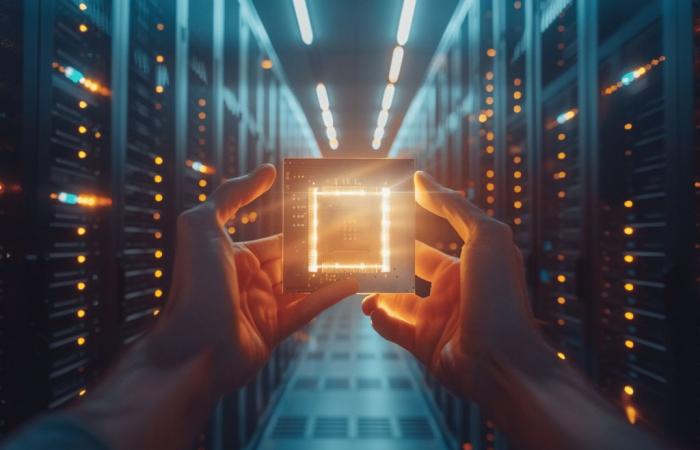As the field of technology continues to evolve, DPUs (Data Processing Units) are redefining the future of IT infrastructure. These next-generation processors combine exceptional performance with programmable modification capability. That’s why some experts believe DPUs could join CPUs and GPUs as the essential carriers of computing. Now let’s dive into the details to understand this cutting-edge technology.
Definition and importance of DPUs
DPUs, or data processing units, are programmable processors specialized in moving data within data centers. Featuring a programmable network interface and multi-core processor, DPU is the cornerstone of modern chip technologies.
Its ability to dynamically adapt its acceleration engines pave the way for autonomous computing platforms. This marks a major evolution in cloud computing technology.
According to NVIDIA CEO Jensen Huang, “This will represent one of the three major pillars of IT in the future”. He specifies : “The CPU is for general computing, the GPU is for accelerated computing, and the DPU, which moves the data around the data center, does the data processing. »
This highlights the growing importance of DPUs in the effective management of big data. This is a crucial challenge for today’s IT infrastructures.
Composition and functionalities
A DPU is essentially a system-on-a-chip (SoC) that combines several technological elements. First, it includes a powerful multi-core processor, often based on the widely adopted Arm architecture.
Second, it has a high performance network interface which can process data at line rate. That is to say at the maximum network speed.
With these capabilities, DPUs find their use in various practical applications. They are crucial for artificial intelligence And machine learning. These technologies enable efficient processing and analysis of Big Data.
Additionally, they play a role in video transcoding and streaming, improving the fluidity and quality of live transmissions. These units also support processing and securing network traffic, while boosting storage I/O performance. Thus, DPUs are becoming essential components for optimizing the performance and security of modern IT systems.
These characteristics make DPUs particularly suited to supporting an isolated computing platform, without an operating system. They thus define the foundations of the next generation of cloud computing.
DPU versus CPU and GPU: what makes it different?
DPUs (Data Processing Unit)the CPUs (central processing units) and GPUs (graphics processing units) represent different categories of computer processors, each with a specific function.
The CPU, considered the brain of the computer, manages general system operations and performs the majority of calculations. In contrast, the GPU specializes in graphic processingwhich is essential for rendering 3D images and videos.
The DPU, for its part, is a recent technical advance dedicated to data management optimization. It is suitable for improving network, storage and security operations in data centers.
Architecturally, CPUs are equipped with a few powerful cores designed to execute sequences of instructions in an effective way. GPUs, on the other hand, have many simpler cores, suitable for processing multiple tasks in parallel. This makes them ideal for graphics-intensive applications.
DPUs combine traditional processing cores and hardware acceleration blocks. They also integrate a high-performance network interface, thus facilitating massive data processing.
In terms of applications, CPUs are ubiquitous, found in a variety of devices from smartphones to servers. GPUs, preferred in computers dedicated to gaminghandle complex graphics tasks.
Finally, DPUs mainly find their place in data centers. They optimize information management and enhance the security and efficiency of data storage and transmission.
What impact do Data Processing Units have on IT systems?
In modern data centers, Data Processing Units (DPUs) play a crucial role by optimizing system performance. They handle specialized IT tasks. This management leads to better allocation of resources in the servers. It thus considerably improves efficiency, in particular in large-scale infrastructure. These DPUs are responsible for specific functions that would otherwise place a heavy burden on the central processor.
First, the DPU orchestrates the transfer of data through the system. This ensures rapid and efficient flow, essential for smooth network operation. Next, it supports data reduction, processing large volumes of information to distill it into more manageable formats. This frees the main processor from this intense responsibility. Additionally, DPUs perform encryption processes intended to secure dataa vital function for maintaining the confidentiality and integrity of information.
Additionally, DPUs enhance security with robust frames. They often include firewall capabilities. These capabilities allow them to effectively manage Transport Layer Security (TLS) operations. They also improve Internet Protocol Security (IPSec)strengthening the network defense.
Based on zero trust principles, they deploy rigid security checks on entire network traffic. This thereby increases protection against threats, strengthening the overall security of the system.
When it comes to networking and communication, DPUs take on and accelerate specific network functions. In doing so, they unload the central processor, leaving it free for application-oriented activities. They also efficiently handle various communication protocols, ensuring seamless data flow across the network.
Integration of DPUs into SmartNICs
Especially since DPUs are not limited to being used as standalone processors. They are often integrated into SmartNICsessential network interface controllers for next-generation servers.
This integration allows more efficient and secure data management and network communications.
On the contrary, some devices that claim to be DPUs do not always meet the three essential criteria mentioned above. This may limit their effectiveness and applicability in complex network environments.
One of the strong points of DPUs (Data Processing Unit) rests on their energy efficiency. These technological devices reduce the workload of processors by supporting intensive processing operations. As a result, the overall energy consumption of the system is significantly reduced.
By thus unloading the processor, the DPUs allow more ecological and economical operation of data centersespecially when operating under heavy load.
Therefore, this energy efficiency offered by DPUs is not only a financial advantage. It is also an integral part of an approach focused on sustainable development.
By reducing energy consumption, DPUs directly contribute to reducing the carbon footprint of data centers. As a result of this optimization, companies can not only improve their operational efficiency but also strengthen their environmental commitment.
Future prospects and evolution of DPUs
DPUs are expected to become fundamental elements of future computer architectures. Featuring sophisticated processor cores and hardware acceleration blocks, they are able to support complex processes. This capability is also true in large-scale cloud computing and data center environments.
The continued development of DPUs suggests a future where their role extends beyond simple current applications. They will include advanced encryption, network traffic management and enhanced security features.
Share the article:
Facebook
LinkedIn
Our blog is powered by readers. When you purchase through links on our site, we may earn an affiliate commission.






